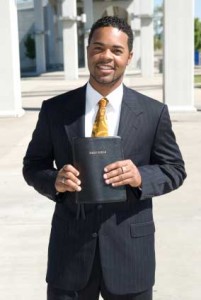 Anyone who has recently become ordained may be wondering exactly how to be a pastor. The responsibilities of being a pastor include delivering a well prepared sermon to the congregation each week during church services. The goal of these sermons is to assist the parishioners with their belief in both the doctrine of the church and their relationship with Christ.
Anyone who has recently become ordained may be wondering exactly how to be a pastor. The responsibilities of being a pastor include delivering a well prepared sermon to the congregation each week during church services. The goal of these sermons is to assist the parishioners with their belief in both the doctrine of the church and their relationship with Christ.
Prior to being able to stand before a church and be it’s leader, one must complete the journey of the ordination process. By completing this process, the church officially recognizes the individual’s abilities to perform various types of religious services, including weddings, funerals, baptisms, and other church doctrine-specific acts. Once completed, the individual can apply to openings within their church network for employment as a pastor.
Pastors take on the role of counselor and crisis manager, as members of the church deal with crises, or have experienced a life altering tragedy such as death or sickness. When undertaking the responsibilities of counsel, these church leaders assume the same legal expectation of confidentiality as do licensed medical practitioners such as clinical psychologists and psychiatrists. Without this bond of trust and confidence, the lines of communication between member and leader would break down.
One of the most important tasks that is performed once an individual becomes ordained, is to administer communion. Leaders within the church such as elders and deacons who have not completed the ordination process cannot give communion, as that task is strictly adhered to by the ordained personnel within the church. Another very important portion of being ordained is the teaching of the scripture and church beliefs. This is completed through formal bible study, Sunday school services and organization, and one on one counsel with members of the congregation.
When disputes or disagreements find their way into the business dealings of the church, the ordained leader of the church acts as the buffer. An example would be if members of a board of directors cannot come to a suitable agreement on actions directly affecting the church, or if there are disagreements and friction between individual members of the congregation. This leader acts on the belief of good faith, and attempts to temper any ill-will that may have lasting effects within the church body. These duties are implicitly required to be a successful leader within any church.
The ordained leader of the church will often lead prayers, not just for members of the church, and not just for Christians, but for anyone who is deemed in need of God’s love and guidance. Asking for the Lord’s blessing for those who are in desperate need of his love or forgiveness, provides the church an opportunity to convey the Lord’s message through prayer and good deeds for their fellow man. As the ordained leader of the church and all that encompasses, this individual oversees the junior ordained leadership to ensure a strong structural hierarchy.



